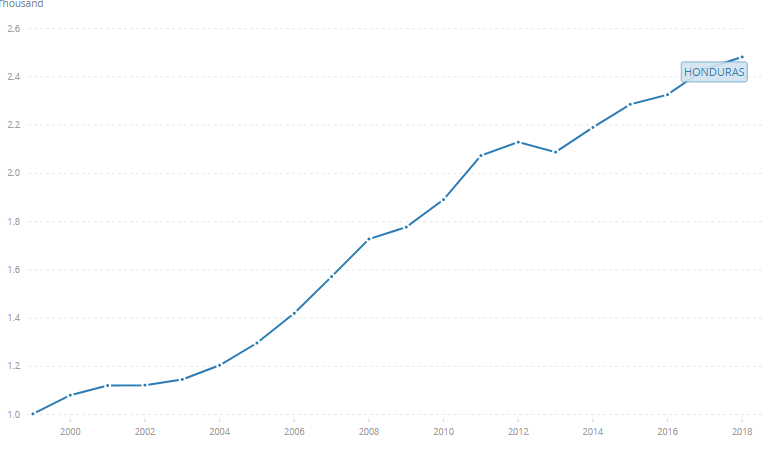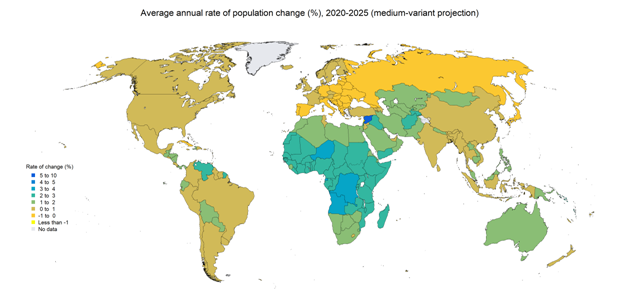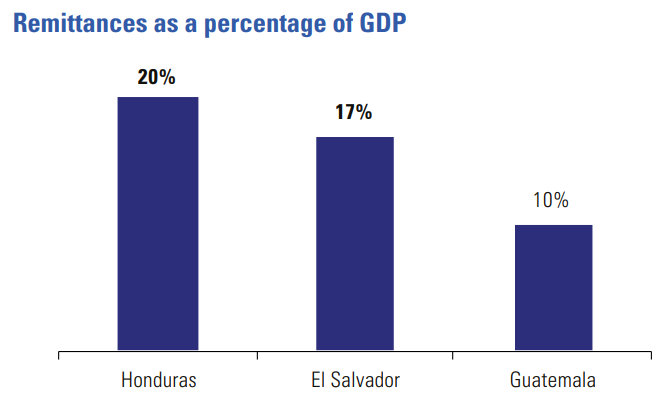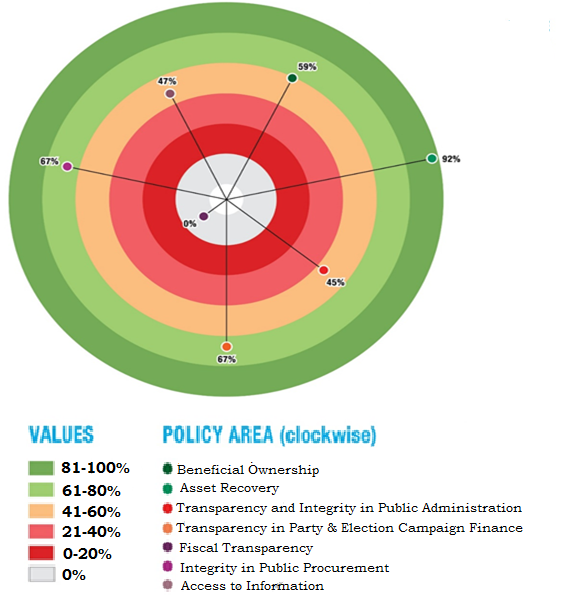Introduction
Globalization is an integral part of modern world development, which has an impact on all spheres of people’s life. However, this process affects states differently as some of them receive profit and benefit from it, while others only aggravate their crisis and become dependent on global players. Honduras belongs to the second category of countries, since problems of poverty, crime, and instability are still relevant to it. However, globalization has brought Honduras some positive changes to its economic and political development but put it into dependence from global international actors.
The Economy
Honduras is a democratic state with an open market economy and one of the poorest countries in Central America.1 A poorly-developed industrial structure, corruption, and a high level of criminality slow down the growth of the economy and discourage foreign investors. In recent years, the government of Honduras has been trying to change the situation by implementing reforms and expanding international cooperation, which contributes to a significant increase in GDP.2 However, Honduras remains dependent on trade with the United States, which is one of the state’s largest trading partners.
The main sector of the economy in Honduras is the agricultural industry, as the country’s climate and position contribute to the growth of coffee beans, bananas, cotton, olives and other vegetables and fruits.3 In addition, the state produces most of the clothes, as well as tires for cars and some building materials, which are a valuable export item4. Thus, although Honduras is more an agricultural country, the level of the industry allows it to produce and export various products in small volumes.
Despite the high level of crime, corruption, and other internal factors, Honduras has significantly raised its GDP over the past 20 years, as can be seen in Figure 1. Analysts observed an unusually high growth from 2015 to 2018, when GDP grew by 3.8 percent in 2015 and 2016, and 4.8 percent in 2017, and by 3.7 percent in 2018.5 Such changes occurred due to government reforms to diversify the market, simplify bureaucratic procedures, and develop infrastructure. In general, the level of GDP in Honduras has only increased over the past twenty years, except for the period after the global financial crisis, which shows positive trends in the development of the economy.

Nevertheless, although, in general GDP per capita shows the same indicators as total GDP, 17.2 percent of the country’s population is still below the poverty line.67 Poverty leads to an increase in crime, which in turn reduces the amount of foreign investment. These trends are interdependent, so the main task of the government is to increase the attractiveness of the Honduras market for investors and businesses.
The current trade situation of Honduras shows both positive and negative trends. The leading trading partner of Honduras is the United States, which has 41 percent of all exports; other partners are Mexico, Canada, Guatemala, El Salvador, and the European Union.8 In general, Honduras is experiencing a trade deficit, although its volume decreased from $ 652 million in 2018 to $ 522 million in 2019.9 This figure is too high as Honduras has an advantageous strategic position in the center of Latin America with access to the ocean. The underdeveloped regional trade of Honduras with neighboring states is also a negative aspect, since the country is dependent on one partner of the United States. However, a positive trend is that in general, the level and pace of international trade has quadrupled over the past 20 years, which is an indicator of development.10 Thus, although the trade of Honduras is rather weak, it still develops and brings revenue to the state.
The level of foreign direct investment is also insignificant, both due to the low level of the country’s development and its numerous domestic problems. According to the World Bank, Honduras has one of the highest crime rates, 41 murders per 100,000 inhabitants.11 In addition, the state has issues with drug trafficking, criminal gangs, and corruption, which makes it unattractive to foreign investors. Nevertheless, the country is attractive for investments in the agricultural sector due to the cheapness of the workforce and the favorable climatic condition. For example, U.S. foreign direct investment in the country amounted to $881 million in 2012.12 Besides, over the past few years, the government has been trying to improve the attractiveness of the Honduras market by simplifying bureaucratic procedures and fighting crime. And although these changes have not yet brought significant results, they have the potential, since the additional funds can be used for the reduction of poverty and crime, making the country even more attractive for investors.
Population
The population of Honduras in 2019 is 9,746 thousand people.13 The country is democratic and multinational, but the majority of the people are natives of Honduras. Over the past twenty years, the amount of people living in the state has almost doubled, since, in 1990, there were only 4,955 thousand citizens.14 This indicator is quite serious and shows significant changes that have occurred in the state. In addition, according to the World Bank, the infant mortality rate decreased from 37 to 15 cases per 1000 newborns, while the fertility rate also fell from 4.5 to 2.5 births per woman. 1516These statistics also show global trends as in most countries with a high level of income, adults prefer to have one or two children. Consequently, increased income and the desire for Hondurans to provide better conditions for several children has reduced the number of births in families. According to Bailey, such infant mortality rates were made possible by the reform of medical decentralization, which made medicine more accessible.17 Thus, one can assume that the main reason for the population growth was not fertility, but an increase in life expectancy due to improved living conditions and medicine.
However, even though the number of Hondurans doubled in the last decades, in recent years, there is a trend of decreasing population growth. The percentage growth rate declined from 2.82 percent in 1995-2000 to 1.67 percent in 2015-2020.18 This trend may be associated with a high level of poverty and crime in the country, but at the same time, with greater availability of contraception and increased awareness in family planning. Besides, the WHO estimates that population growth in Honduras will decrease to 1.53 percent by 2020-2025, as it is shown in Figure 2. By 2075 the number of inhabitants will begin to decline rather than grow.19 Thus, modern global trends, combined with the economic development of the country, were reflected in the demography of Honduras from a positive perspective.

Migration
Honduras is a country with a high level of emigration, but there are few foreigners or refugees who come to the state, since the internal conditions are not the most suitable. Today, according to official data, 8 percent of Hondurans live abroad.20 However, these numbers can be much bigger due to the high percentage of unregistered migrants. The reasons for migration are justified by both historical reasons and the current situation in the country, including poverty, crime, and environmental factors.
Migration from Honduras began actively in the late 1980s when the state suffered a significant economic decline and increased criminal activity. At that time, joint military bases of the USA and Honduras were actively being built on the territory of the state, which increased the level of militarization.21 Reagan’s administration also contributed to the internal reforms of Honduras, which led to a weakening of the country’s position in the world trade in coffee, and the destruction of traditional forms of agricultural farming.22 For this reason, people in poverty were forced to seek better conditions abroad.
Moreover, additional damage was also caused by Hurricane Mitch in 1998, which brought significant losses to both the entire agricultural industry in the country and people who were left without housing and protection.23 This disaster was the cause of many Hondurans to find a state in which they could work and settle without threatening their lives. The next reason was political instability, combined with the consequences of the global financial crisis, when, in 2009, the military overthrew the liberal president Manuel Zelaya and took the place of government.24 Poverty became even more noticeable, which increased the level of violence, and the new rule pushed many Hondurans to flee the country.
The current causes of migration are the same as they were ten years ago, such as poverty, high levels of violence, and the lack of social protection for the population. The fear of Hondurans for their lives is as common reason for migration as the lack of money because 1000 residents account for 43 cases of homicide.25 People who are tired of the violence surrounding their existence are forced to seek security outside their home country. The most popular destination for migration among the Hondurans in the United States as this state can guarantee them several times higher wages in their homeland.26 However, due to changes in the US migration policy, this process has become much more difficult for Hondurans, so they are looking for other countries to live in or work illegally.
At the same time, remittances bring more to the budget of Honduras than any other sector of the economy in the country, including agriculture. 27 Moreover, this figure is higher than in all countries in Northern Central America, as can be seen in Figure 3. Consequently, at the moment, it’s even profitable for the state that its citizens work abroad, as this brings them significant revenue to the budget. For migrant families who stay in Honduras, such kind of work is often the only way to live. However, this fact does not mean that the inhabitants of Honduras prefer this earning, but they must work away from home. In addition, as Reichman notes, although remittances are vital to the Honduran economy, such a policy cannot work in the long run.28 If there will be any changes that reduce or block the access of money transfers from abroad to Honduras, this threatens with a deep crisis in the country. Consequently, the government should be interested in providing conditions for its citizens, in which they will bring income to the country and their families without moving abroad.

Development and the SDGs
The goals of sustainable development are mostly aimed at countries with a low level of economic growth or democracy, although all states of the world should participate in their implementation. Honduras has many internal problems that coincide with the goals of sustainable development, for example, poverty, inequality, low level of education and medicine, absence of decent work, and others. For this reason, the government of Honduras is interested in the implementation of these goals and cooperation with economically developed countries that can help them solve problems. Moreover, Honduras has many shortcomings that have to be eliminated, but the main purpose of sustainable development for them is the reduction of poverty.
Most goals of sustainable development are interconnected; therefore, Honduras also has to make other changes to improve the life of its citizens. Consequently, the government takes measures to get stable economic growth, provide a decent job to citizens, ensure the security and work of strong institutions by realizing the program of poverty reduction. In this case, changes in one area are not possible without adjustments in dozens of other spheres. One of the main reasons that affect the level of wealth and the equal distribution of income in the country is corruption, and the government should also focus on its elimination. This struggle is difficult for Honduras, since most politicians and oligarchs still have an impact on state institutions and impede the implementation of quality reforms.29 Thus, although the primary goal of sustainable development is to combat poverty, it includes other related issues.
In recent years, Honduras has shown significant success in the fight against poverty, as the level of GDP growth remains relatively high, and the level of violence and corruption has reduced. This change is facilitated by improving legislation and decreasing the influence of bureaucracy in the country. For example, the government passed a law on the financing of political parties, and it also signed an agreement that increases the responsibility of public procurement, the private sector, and state anti-corruption agencies.30 The improvement of the lawmakers and the creation of a new institution made the information on the distribution of the budget more transparent, which helped to reduce the level of corruption. In addition, efforts to fight drug trafficking, violence, and crime have brought results and made the country more attractive to foreign investment. These changes affect both the residents of the country and the state’s international image because world leaders see the government’s desire to develop and change.
However, despite the reforms, Honduras should adopt many other changes to the current legislation to ensure equality and reduce corruption in the country. Honduras takes a liberal and democratic approach to solving the problem by applying reforms rather than radical measures, so this process can continue for a long time. Unfortunately, political forces still have an influence on independent structures, which makes their work ineffective.31 For this reason, many goals, such as ensuring transparency of public authority, fiscal transparency, or accessibility of information, are still not fully realized, as can be seen in Figure 4.

Therefore, Honduras is interested in achieving the goals of sustainable development as this is part of its national interests. For Honduras, like for any other state, is important to overcome poverty and hunger, improve medicine and education to meet the needs and interests of its citizens and give them a better future. For this purpose, the government implements reforms and takes measures to combat the main causes of poverty that are corruption, inequality, and crime. However, the state’s capabilities are limited, so the process of achieving this goal is long and complicated, and the government needs the support of other countries.
Conclusion
The processes of globalization have a positive and negative impact on all countries of the world. However, for states with a low level of economic development, any changes in the global context bring more damage and less benefit than a major international actor. Honduras is in such a position, as it currently benefits from globalization by developing its trade and receiving support from other countries. The advantages of global and regional trade are significant at this stage as it helps Honduras build up economic capacity. UN support is also necessary for the state and falls within the interests of the organization at the same time, since Honduras is part of a project to implement the goals of sustainable development.
However, globalization creates the state’s dependence on international organizations and the USA in particular because they are the primary support for the country’s income sources. Moreover, Honduras has little regional relations and influence, so it cannot rely on the assistance of the neighboring states. Thus, in the event of adverse changes in international relations, Honduras could suffer a significant loss for the economy. Consequently, globalization has ambiguous effects on Honduras by putting the state into dependence on it and, at the same time, supporting its development.
References
Aberle, Niko. “Measuring Honduras’ Progress Towards UN Sustainable Development Goals.” Association for a More Just Society, 2017.
Bailey, Emelie “Healthcare Access Under Health System Decentralization in Honduras: A Mixed Methods Study.” PhD diss., Ohio State University, 2016.
Economic Commission for Latin America and the Caribbean (ECLAC). Atlas of migration in Northern Central America (LC/PUB.2018/23). Santiago, 2018.
“Fertility Rate, Total (Births per Woman) – Honduras.” The World Bank.
“GDP per Capita (Current US$) – Honduras.” The World Bank.
“Honduras Balance of Trade.” Trading Economics.
“Honduras Export“. Trading Economics.
Lehmann, Kai E. “The Social Conditions of Corruption in Honduras: What They Are, What They Mean, and What Can Be Done About Them”. In Corruption in Latin America, edited by Robert Rotberg, 265-286. Cham, Switzerland: Springer, 2018.
Meyer, Peter J. Honduras: Background and U.S. Relations. Washington, D.C.: Library of Congress, Congressional Research Service, 2015.
“Mortality Rate, Infant (per 1,000 Live Births) – Honduras.” The World Bank.
Nevins, Joseph. “How US Policy in Honduras Set the Stage for Today’s Migration.” The Conversation, 2016.
Reichman, Daniel R. The Broken Village: Coffee, Migration, and Globalization in Honduras. Ithaca: ILR Press, 2011.
“The World Bank in Honduras.” The World Bank.
United Nations, Department of Economic and Social Affairs, Population Division. World Population Prospects 2019, Volume I: Comprehensive Tables (ST/ESA/SER.A/426). New York: United Nations, 2019.
Footnotes
- “The World Bank in Honduras,” The World Bank.
- “The World Bank in Honduras.”
- “Honduras Export,” Trading Economics.
- “Honduras Export.”
- “The World Bank in Honduras.”
- “GDP per Capita (Current US$) – Honduras,” The World Bank.
- “The World Bank in Honduras.”
- “Honduras Export.”
- “Honduras Export.”
- “Honduras Balance of Trade,” Trading Economics.
- “The World Bank in Honduras.”
- Peter Meyer, Honduras: Background and U.S. Relations (Washington D.C.: Library of Congress, Congressional Research Service, 2015), 26.
- United Nations, Department of Economic and Social Affairs, Population Division. World Population Prospects 2019, Volume I: Comprehensive Tables (ST/ESA/SER.A/426) (New York: United Nations, 2019.
- United Nations.
- “Mortality Rate, Infant (per 1,000 Live Births) – Honduras,” The World Bank,.
- “Fertility Rate, Total (Births per Woman) – Honduras,” The World Bank.
- Emelie Bailey, “Healthcare Access Under Health System Decentralization in Honduras: A Mixed Methods Study” (PhD diss., Ohio State University, 2016.
- United Nations.
- United Nations.
- Economic Commission for Latin America and the Caribbean (ECLAC). Atlas of Migration in Northern Central America (LC/PUB.2018/23) (Santiago, 2018.
- Joseph Nevins, “How US Policy in Honduras Set the Stage for Today’s Migration,” The Conversation, 2019.
- Ibid.
- Peter Meyer, Honduras, 13.
- Economic Commission, 14.
- Economic Commission, 17.
- Economic Commission, 17.
- Daniel R. Reichman, The Broken Village: Coffee, Migration, and Globalization in Honduras (Ithaca: ILR Press, 2011), 71.
- Reichman, The Broken Village, 72.
- Kai E. Lehmann, “The Social Conditions of Corruption in Honduras: What They Are, What They Mean, and What Can Be Done About Them,” in Corruption in Latin America, ed. Robert Rotberg (Cham, Switzerland: Springer, 2018), 268.
- Niko Aberle, “Measuring Honduras’ Progress Towards UN Sustainable Development Goals,” Association for a More Just Society, 2017.
- See note 29 above.